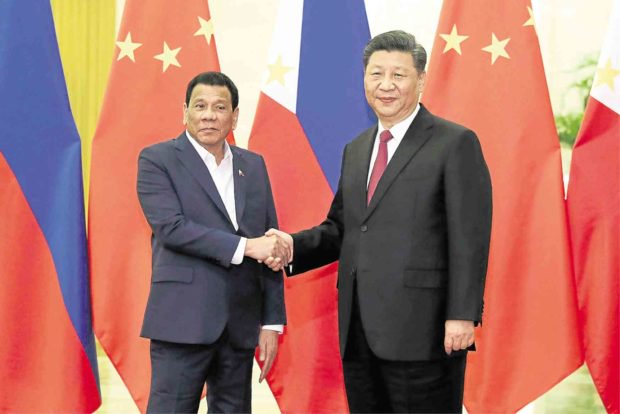
NO TRUST ISSUES HERE President Duterte and Chinese President Xi Jinping during the Philippine leader’s visit to Beijing in April 2019. —AP
MANILA, Philippines — Even without the landmark arbitral ruling that favors the Philippines, any exploration that would be jointly undertaken with China in the West Philippine Sea would still be unconstitutional.
Bayan Muna chairperson Neri Colmenares pointed this out Wednesday, as he reminded President Rodrigo Duterte that a joint exploration with China within the Philippines’ exclusive economic zone (EEZ) contradicts provisions in the 1987 Constitution.
“Article XII Section 2 of the Philippine Constitution requires that the Philippines fully control any exploration or utilization of our natural resources. A joint exploration with China does not grant the Philippines full control since it is a joint undertaking,” Colmenares, a lawyer by profession, explained in a statement.
“Any joint exploration with China therefore is unconstitutional. In fact China could very well demand more than 50% control of the exploration. China has violated our territorial sovereignty in the [West Philippine Sea]. We cannot allow it to trample our Constitution,” he added.
Colmenares also said that such a move allowing joint exploration with China could be tantamount to treason, describing the developments as reminiscent of what happened under the administration of former President Gloria Macapagal-Arroyo.
When Arroyo was still president, the Philippines, China, and Vietnam ventured into a Joint Marine Seismic Undertaking (JMSU) – a study that has been plagued with corruption issues.
“This amounts to betraying Philippine sovereignty in exchange for another onerous deal just like what happened with the JMSU under the Arroyo administration in 2005, which allowed China to find sources of oil in the [West Philippine Sea] in exchange for onerous loans and projects,” he noted.
“Nakakalungkot na gobyerno mismo ang nagkanulo sa Pilipinas kapalit ng ilang overpriced at maanomalyang kontrata katulad ng NBN-ZTE deal noon, and now it is happening all over again,” he then lamented.
In a speech in Malacañang a week after arriving from his fifth visit to Beijing, Duterte said he is thinking about setting aside the decision of the Permanent Court of Arbitration in exchange for joint exploration with China.
In 2016, PCA invalidated Beijing’s nine-dash line that covers almost the entire South China Sea including the West Philippine Sea, saying it is without historical and legal basis.
Duterte mentioned the PCA decision before Chinese President Xi Jinping during his latest trip to Beijing but the Chinese leader once again brushed it aside, standing firm that China would not recognize the landmark arbitral decision.
READ:Duterte unfazed over China’s firm stand vs arbitral ruling on S. China Sea
READ:Xi rejects PH win in South China Sea as Duterte insists ‘binding’ arbitral ruling
West Philippine Sea INQUIRER FILE
JMSU legality still in question
Bayan Muna Rep. Carlos Zarate, meanwhile, urged the public to be vigilant and to scrutinize the rules for the Philippines-China exploration, warning that it could end up being a lopsided venture in favor China.
“It is the government itself that is selling us out. That is why we must be very wary of lopsided and unequal joint exploration agreements with China,” Zarate said.
He also noted that the question on the legality of the JMSU forged during the Arroyo administration has yet to be resolved by the Supreme Court.
“It’s not true that the Supreme Court has declared the JMSU constitutional. In fact, we filed a Motion in 2014 asking the Court to resolve the issue. Now that China lost the [West Philippine Sea] case under UNCLOS in The Hague ruling, we hope the Supreme Court will now find it appropriate to rule in favor of the Philippines,” Zarate added.
UNCLOS or the United Nations Convention on the Law of the Sea is an international treaty that establishes rules on uses of the ocean and its resources. It was adopted in 1982 and signed by 117 states, including the Philippines.
Asserting the country’s territorial rights in the disputed South Chinese Sea was one of Duterte’s many promises during his campaign for the presidency. He even said he would ride a jet ski to Spratlys and install a Philippine flag in its islands.
READ:Duterte grounds jet ski vs China
READ:Why Duterte won’t ride jet ski to Spratlys, disputed islands
He also vowed to implement an independent foreign policy, seen by many as a way of veering away from American influence. However, critics have dismissed the strategy as merely a ploy to get close to China.
READ:Duterte: Gov’t to pursue ‘independent foreign policy’
READ:‘Two faces’ of PH foreign policy hit
/kga